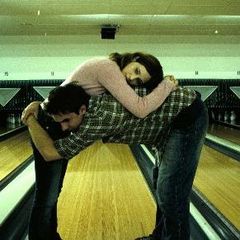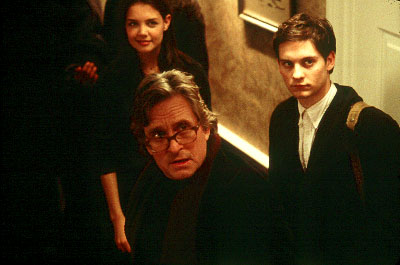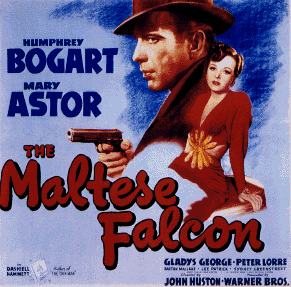My friend Chad Betz posted this on his xanga a while ago, and it was so insightful and well-written that I shall include it here.
Whisper Slurry: Little Children of Men
ah, the hopes of humanism.
weirdly, there's been a movement in recent cinema where fatalism has been appropriated by humanist ideology for the purpose of aggrandizing the humanist dream of complete self-actualization. it probably didn't start with American Beauty, but that's a good touchstone. these are films that recognize the depravity of man, yet use that depravity as a catalyst which pushes characters to navigate everything from the dirty underground of suburbia to a dystopian wasteland in an effort to escape themselves. and they somehow, almost magically, succeed. humanity is the inhuman scourge, but humanity is also the superhuman savior, and in humanity we ultimately trust.
philosophically, it's illogical. or naive. the dead cannot save themselves. it's that basic tenet that forces me to accept my own Christianity. i know the magnitude of my own degradation, and it is absolute, and the only thing that can give me new life is for absolute purity, absolute wholeness and light, to sacrifice itself on my part. absolute purity does not exist within man; how these films can spend two hours depicting that truth and yet somehow ignore it at the same time is beyond me.
Todd Field makes surprisingly moral films. with In the Bedroom, he attacked murder, violence, hate. with Little Children, it's sexual deviancy and adultery that bear the brut of his ire. he attempts to paint the reality of these issues (few cinematic murders have as much impact as the one in In the Bedroom), but there's an undeniable moralist bent that determines the plot and the actions of his characters. In the Bedroom, when all is said and done, is not a great film. it's a short story bloated to feature length, and its structure is a little suspect, but it felt singular in its attention to acting details (Field himself an actor) and in its willingness to let key scenes really breathe. however, in that the film condemns its characters actions without clearly offering an alternative (a shot of a town steeple almost seems incidental), it's a serious movie that feels a little too dour. and i'm not saying that these characters must turn to God, but they turn to themselves and find nothing. which, i guess, is a truthful conclusion in its own right, even if it won't be winning any feel-good awards.
unfortunately, contrivances overwhelm authenticity on Field's follow-up. with all kinds of cute storytelling gimmicks and a narrator that sounds straight out of NFL's Greatest Games, Little Children plays less like the meticulously rendered modern chamber drama that was In The Bedroom and more like Desperate Housewives for the art house crowd -- or the biggest (anti)spiritual successor to American Beauty yet. again, the movie runs long, and this time with some completely unnecessary story tangents. it's fairly entertaining and involving for being your run-of-the-mill infidelithriller pulp, and i admire the way Field treats sexual deviancy and adultery as, at their cores, being immoral not because of their illegality in the eyes of state or social mores, but because they are behaviors which often hurt "the ones we love" and are mindful only of self-gratification. unlike the more ambiguous In the Bedroom, though, these characters manage to shake themselves out of their wayward mindsets. in almost every case, their epiphanies are less than satisfying. one character changes because he receives a note that tells him to "be a good boy." Kate Winslet's character realizes she should love her daughter more. a neighborhood watchdog/ex-cop feels guilty about the death of an elderly woman. Patrick Wilson goes skateboarding. again, it's refreshing how Field treats the idea of "love" as a decision that his characters must actively make in order to redeem themselves, but to my mind divine love, agape love, is the only thing that could affect these reactions in characters who are so entrenched in what they feel and want. of course, agape love could be manifest through the events that the film depicts, but it doesn't add up that way, especially not when Wilson's character apparently only needed some kind of thrill trip to make him feel vital and alive again.
far more aesthetically impressive and viscerally gripping, Alfonso Cuaron's Children of Men is no less disappointing in terms of what it promises and yet how trapped it is by adhering to humanism, by carefully avoiding.the idea that salvation must come from something which is external to humanity. the title itself almost feels like a riff on the idea that Jesus was son of God and son of Man. for Cuaron and novelist P.D. James, all that's needed is the latter, the sons and daughters of Man, the hope that future mankind will improve upon its present self. i've heard some of the film's defenders among the Christian left state that the film's filled with religious imagery, but it seems clear to me that Cuaron is appropriating that imagery for the purpose of imbuing the film's humanism with the sort of mythic import and grandeur found naturally in religious mysticism while at the same time making a mockery of that which it emulates. the pregnant girl in Children of Men tells Theo (Clive Owen) that she's a virgin, Theo gapes for a moment, and then she says she's just kidding and the audience enjoys a laugh at the thought of such a thing as an immaculate conception. this, however, doesn't stop Cuaron from romanticizing and stain-glassing his own humanist worldview, even in the face of all the terrible things he shows humans doing to each other. P.S. i haven't seen anyone argue that the name of Clive's character has any allegory to it, probably because they realize the implications that'd have for Malcolm Jamal Warner. but if you do want to take his name as allegorical, let's consider the function his character fulfills in the film and what happens to him in the end. yeeeahhh.
i'm gonna go ahead and indulge in some more standard criticism here, for i do want to recommend that all of you check out at least a matinee of Children of Men. it needs to be seen in the theater. and why? well...
Children of Men is stunning stuff for various reasons, if not for the reasons that really count in the long run. Cuaron focuses so intensely on manufacturing a filmic social realism for the sci-fi setup, most everything else is neglected or communicated via the standard moments of levity or sappy score cues. the film's got detail, visual chutzpah, and versimilitude out the ass (and a fat fistful of pathos), it just has very little in the way of strong character development (almost all of it is delivered through expositional dialogue) or intricate storytelling (basically, it's a dystopian road movie) or engaging philosophy (amounts to a dictation: "have faith in humanity"). i'd like to think that Cuaron's balancing of hopelessness with hope works better than it does, but i can't assign too much import to moments like the one where the fighting resumes, because if i do, where does that leave the picture? it'd be rendered as conceptually indecisive as something like Munich.
this is, however, the best post-SPR Spielberg movie that Spielberg didn't make. for whatever's that worth.
the two major action takes, the car sequence and the climactic pursuit sequence, are awe-inspiring. both are marred by some minor glitches and factual errors (e.g. the way the car's windshield dissolves -- laminated glass doesn't behave like that), but are nonetheless an elevation of film manipulation techniques that started around the time of a seamless, unnoticeable digital edit job in Contact. to echo what others have said, this is what Spielberg could have done with his WotW car scene if he wasn't too busy showing off: using the advancements in film technology to suck the audience into a sense of reality in situations so intense the reality is heightened, becoming both dizzyingly dynamic and suffocatingly claustrophobic. Spielberg missed the mark because he went too flamboyant with the camera moves, swung us too far around the point of his characters' perspective, and so lost a grip on the presence of the scene. i mean, Saving Private Ryan isn't exactly a good movie, but it does have some very good scenes in it, and the greatness of the beach sequence lies in Spielberg coming up with a shooting method that turns a fantastically staged action setpiece into something more than that, something grueling, something that the viewer experiences. he did that by having the steadicam operator adopt a continuous perspective at the very center of the action, to the point where the action even affects the camera, but avoids the implication of a narrative first person (which would obstruct the first person of the audience) and the risk of the action becoming unintelligible chaos by using his established characters as spatial and emotional anchors. he tried to push that a step farther with the digital editing in WotW, but he went too far and the flashy camera became too loosely tethered to the characters. we didn't feel trapped with them. Cuaron avoids that mistake. he fixes us right there in the car, and he doesn't let us out until he lets Theo out.
the issue is, then, are we invested in the characters in these scenes because they are characters that deserve our investment, or are we invested because we're watching to see how they'll ever escape these hellish single takes? i'll tell you one thing, at least in the case of the character Miriam (atrociously acted by Pam Ferris), it's definitely the latter. and the whole time i was just rooting for her to bite the bullet. for a related aside: Little Children uses the digital editing trick in place of cross dissolves in a time passage montage. which is okay, i guess, because i hate cross dissolves, but this came off like something you'd see in a car commercial. filmmaking tools can't just be used well, they have to be used with purpose.
back to the philosophical rigamarole, one might say, "so, then, betz, what are you asking for? televangelism?"
of course not. i guess i just wish that artists wouldn't be afraid of their own inclination towards spirituality, because i think that inclination's very evident in films like Little Children and Children of Men, but these movies show Field and Cuaron fighting with that inclination every step of the way, or trying to create a new "spirituality" that abnegates the necessary role of the supernatural. so that's what it comes down to. and it comes down to Pan's Labyrinth not getting here soon enough.
Posted 1/13/2007 "



























